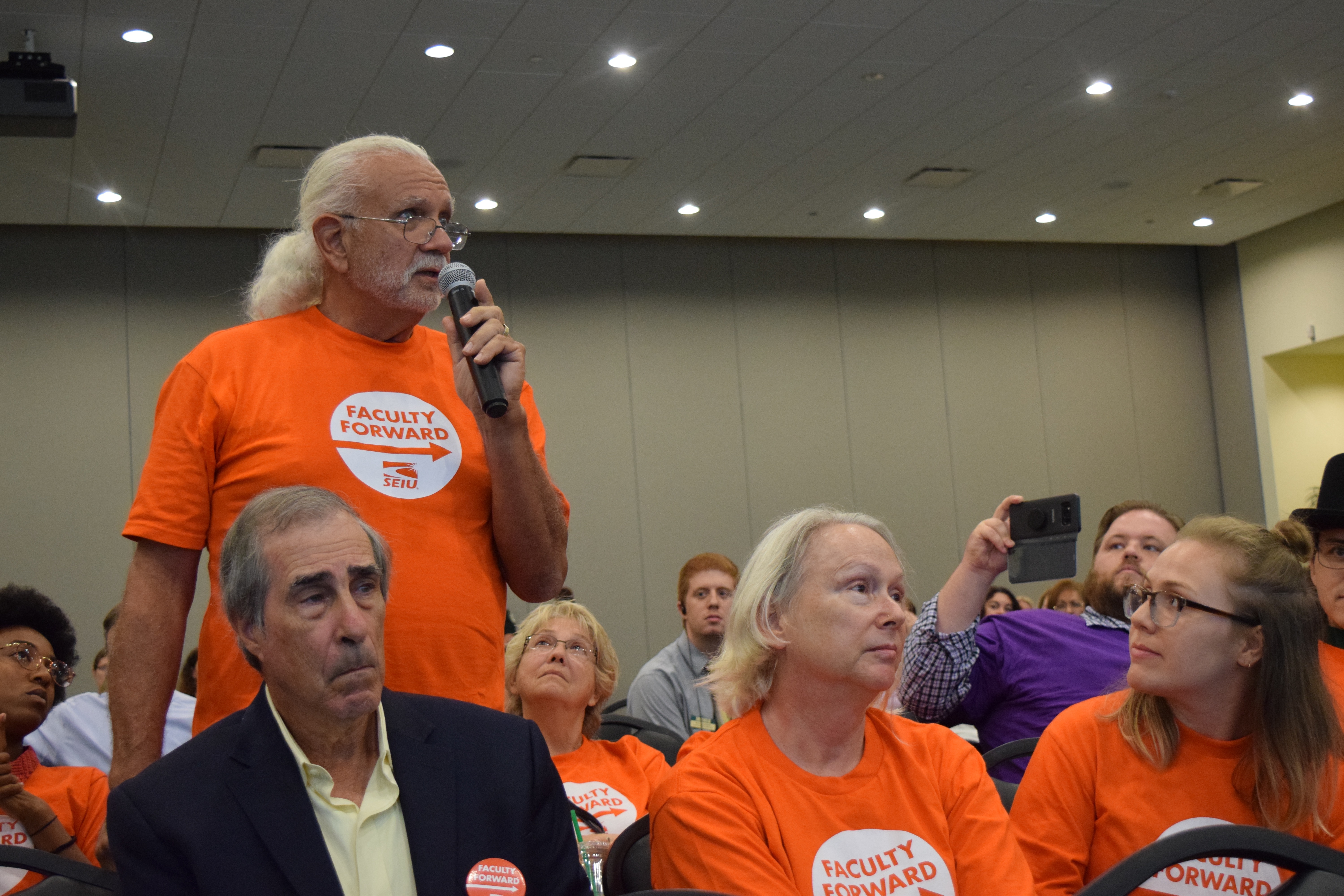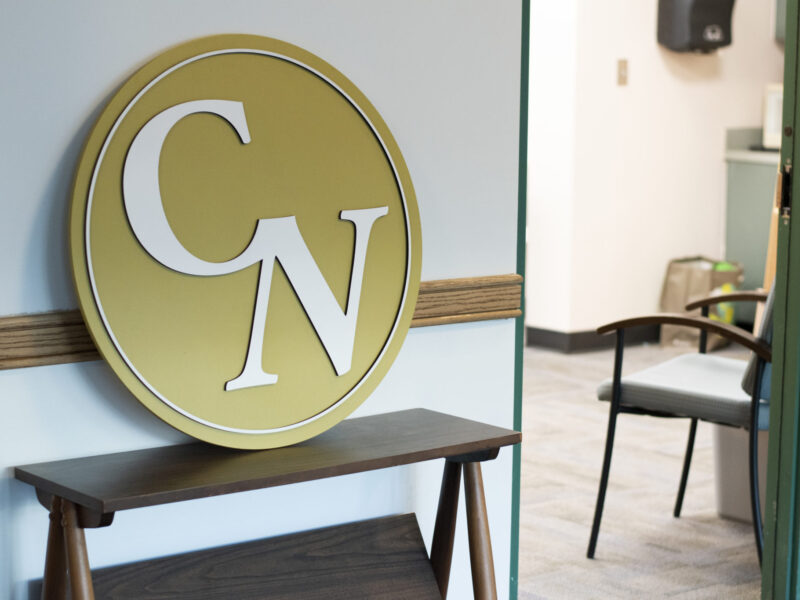Above photo: Several individuals wearing “Faculty Forward” T-shirts questioned USF system president Judy Genshaft at a forum in October 2017 about the state of adjuncts. Jonah Hinebaugh | The Crow’s Nest
By Nancy McCann
The vote is in: USF system adjuncts have voted overwhelmingly to form a union to represent them.
In a tally released Tuesday by the Service Employees International Union, the vote was 326 yes
and 91 no. The state Public Employees Relations Commission, which conducted the election, said there were 893 eligible voters.
“After a long fight, we couldn’t be more excited about today’s victory,” said Dana Corrigan, an
adjunct professor, in a news release from the union. “We’ve been standing up for what’s right and it feels so good to finally have official recognition of our union.”
The adjuncts who fought to unionize – and shared stories of poverty-level wages and unpredictable employment – are part of a nationwide movement of part-time teachers seeking better pay, benefits, job security, and inclusion in campus life.
Previously isolated from any campus power structure, the estimated 900 adjuncts from USF Tampa, USF St. Petersburg and USF Sarasota-Manatee gained the right to be represented by the SEIU.
The USF system joins schools like Duke, Georgetown, Tufts and the University of Chicago where adjuncts have won union elections.
The USF election is the third victory in Florida for adjuncts organized by the union under the name Faculty Forward.
Broward College voted to form a collective bargaining unit for adjuncts in December. Hillsborough Community College – the first public school in the South to form a union for adjuncts – held its election in late 2016.
USF system President Judy Genshaft and the university administration tried to crush adjuncts’ efforts to unionize from the start of the USF Faculty Forward campaign in January 2017.
Messages to adjuncts from top administrators at the three USF system campuses and information sessions delivered by a paid consultant painted a risky portrait of union representation.
In emails sent to adjuncts in March, Olufunke A. Fontenot, the interim vice chancellor for academic affairs on the St. Petersburg campus, attacked SEIU’s reputation and warned that some adjuncts might end up with lower salaries, and that students’ education could suffer, because of unionization.
But this did not stop the overwhelming majority of adjuncts from voting yes in the secret ballot election, which ran from Feb.16 through March 13.
Adjuncts make up around 26 percent of the faculty at the three campuses in the USF system. About half of the faculty at USF St. Petersburg are adjuncts; 23 percent at the Tampa campus and 40 percent at Sarasota-Manatee, according to information from the National Center for Education Statistics.
Across the country, more than half of faculty appointments are part time, and the “common characteristic is that their institutions make little or no long-term commitment to them,” according to the American Association of University Professors.
“Many faculty in so called ‘part-time’ positions actually teach the equivalent of a full-time course
load,” the AAUP says.
USF system adjuncts will have to wait up to 15 working days from March 13 to learn if any post-election objections are filed with the Public Employees Relations Commission. If objections are filed, the other party has seven days to respond.
Some adjuncts participating with Faculty Forward have said they are aware that contract negotiations can be long and grueling after forming a collective bargaining unit, but they view a union as their only hope for improvement.
“Sixty percent of first contracts (negotiated by the union) won a raise of 20 percent for the lowest
paid” and “71 percent of first contracts included professional development funds, valued at
$897,500,” according to information SEIU provided to The Crow’s Nest.
This is the statement released by the SEIU after the results were announced:
Despite aggressive opposition from administrators over the last year, today University of South Florida (USF) adjunct faculty voted by an overwhelming almost 4-1 margin to form their union.
“After a long fight, we couldn’t be more excited about today’s victory,” said Dana Corrigan, a University of South Florida animation adjunct professor, from the Public Employees Relations Committee vote count in Tallahassee. “We’ve been standing up for what’s right and it feels so good to finally have official recognition of our union.”
USF adjuncts, many of whom say their lack of job security and low pay leaves them struggling to cover the basics, launched their high-profile organizing effort in early 2017.
Their resolve was bolstered when they lost (a) university colleague, Robert Ryan, who had signed a union card but died before he was able to cast his vote.
Despite fierce opposition from USF administrators, including an anti-union email and meeting series that garnered national attention, USF adjunct faculty remain positive about the prospect of working with the university.
“As adjunct faculty, we teach so many of the courses and interact so frequently with students, that we know our insights into the classroom are valuable contributions to the campus conversation,” said Gary Simon, a University of South Florida history adjunct professor. “Adjuncts working with our administrators can build a better USF for students and educators alike.”
Despite national and local attacks on unions, including through the high-profile Supreme Court Janus v. AFSCME case, University of South Florida adjunct faculty are the third such group in Florida to form their union in just the last year and a half.
The victory comes as contingent faculty at Hillsborough Community College and Broward College negotiate their first contracts.
“We’re excited to have our colleagues at USF officially join those of us at Broward College and Hillsborough Community College in the fight to transform Florida higher education,” said Carolina Ampudia, a Broward College anatomy and physiology adjunct professor. “By coming together, we know that not only can we change our campus, but together we can lead the way toward affordable, accessible quality education that values educators across our state.”
To this end, adjunct faculty from around Florida converged in Miami last month to discuss ways to improve higher education.
They launched a higher education voter pledge that calls for adequate funding for colleges and universities, safe campuses where all can learn, student loan relief and debt-free college for all, as well as good jobs, fair pay and union rights for campus employees. Already, more than fifteen-hundred Floridians have signed their pledge.



